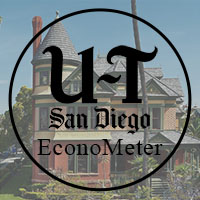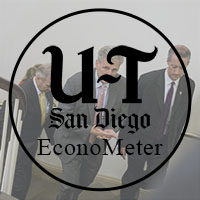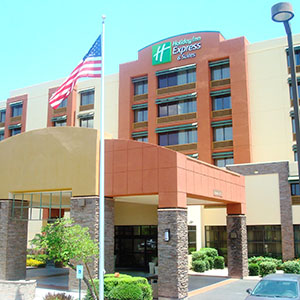US lifts oil export ban — now what?
from San Diego Union Tribune’s EconoMeter panel.
Q: Will lifting the ban on exporting U.S. crude oil lead to higher prices?
Bob’s Answer: NO
Lifting the export ban on oil would allow domestic-energy producers to compete on a level playing field with international exporters. This will contribute to a further increase in international supply, either stabilizing or forcing prices down even more.
This will prevent a further slashing of production and jobs here that is caused by the recent drop in prices. Lifting the ban will likely create new jobs at the same time.
Buy or rent: EconoMeter panel advises
from San Diego Union Tribune’s EconoMeter panel.
Q: Are rents rising so high that home buying becomes a viable option for many tenants?
Bob’s Answer: YES
With today’s interest rates, it pays for most people to buy a home with today’s rapidly rising rents. However, having an available down payment, the ability to qualify for a mortgage, taxes, insurance and association fees as well as money for home repairs must be considered.
Although owning a home is still a great American dream and might have potential tax advantages, it must be weighed against personal finances.
Fed shutdown an economic bummer?
EconoMeter panel considers the fallout if a shutdown takes place
from San Diego Union Tribune’s EconoMeter panel.
Q: Would a federal government shutdown hurt San Diego’s economy?
Bob’s Answer: YES
A federal government shutdown would close all national parks and would likely have a negative impact on travel due to U.S. Customs and other federal agencies shutting down.
San Diego relies on tourism, an industry that produced over $9 billion in economic impact last year alone. The impact would be felt throughout the county and state and a prolonged shutdown would have a serious impact on jobs and consumer spending.
Lodging Forecast 2016
For the past several years we have put out our forecast for 2016 at the beginning of Q4 as we’ve had time to analyze the data and hear from industry experts at The Lodging Conference…
Qualcomm layoffs: A bad sign for high-tech?
EconoMeter panel looks at implications of the cutbacks
from San Diego Union Tribune’s EconoMeter panel.
Q: Do job cuts at Qualcomm signal a tougher time for high-tech workers in the near future?
Bob’s Answer: NO
Top quality high-tech workers will continue to be in high demand, even if their specific areas of expertise need to be retooled for another company’s specific needs. Jobs that require a science, technology, engineering or math-related degree are crucial for the future of the U.
S. economy and will continue to be a significant part of the local economy. While wages may be impacted in the near-term, long-term prospects for these highly specialized workers are bright.
Refugees: A boon to Europe and the U.S.?
EconoMeter panel considers the economic upside of refugee crisis
from San Diego Union Tribune’s EconoMeter panel.
Q: Do the arrival of Syrian refugees in Europe and possibly the U.S. offer an economic upside to the host countries and communities?
Bob’s Answer: NO
Refugees start at a disadvantage and tend to have lower employment rates and are often in lower level jobs than their skills and qualifications might predict. They likely would not have chosen to migrate and often start with the disadvantage of having been traumatized.
They have been “pushed” rather than “pulled” and the host country labor market might not be a good match for them.
Plus, they must be vetted for any terrorism background.
Interest rates going up this month?
EconoMeter panel anticipates Federal Reserve action — or nonaction
from San Diego Union Tribune’s EconoMeter panel.
Q: Should the Federal Reserve raise short-term interest rates this month?
Bob’s Answer: NO
The truth is, while the economy appeared to have returned to relative full health recently, the strong dollar, oil price declines, lackluster jobs recovery and stock market uncertainty have led me to oppose an increase. Our rates have remained flat for almost seven years but I do not feel this economy is ready and I believe consumer confidence and our economic expansion are at risk even if we nudge the rate up just 25 basis points.
RAR Hospitality Acquires Holiday Inn Express & Suites Tempe in Arizona
from Hotel Online (September 2015)
The management and ownership acquisition is the third local partnership with PacVentures
TEMPE, Ariz. – Sept. 8, 2015 – In partnership with PacVentures, San Diego-based RAR Hospitality has acquired The InterContinental Hotels Group (IHG)-affiliated Holiday Inn Express & Suites Tempe, marking their third joint venture into Arizona’s burgeoning hospitality market. Located adjacent to Arizona Mills Mall, which recently won the bid for a new Lego Discovery Center, and surrounded by multiple points of interest, the Holiday Inn Express & Suites Tempe (HIE) has flourished over recent years.
“RAR is thrilled to have another Arizona hotel in its portfolio,” expressed Corporate Vice President Marc Potash. “This market, particularly in the Greater Phoenix area, is primed for explosive growth over coming years, and we look forward to contributing to local success and further enhancing the level of service available at this location.”
RAR has assumed management of the hotel under the leadership of CEO and Founder Robert Rauch, who has significant experience in the Phoenix market. The property will undergo renovations over the next few years to bring the hotel in line with Holiday Inn Express’ Formula Blue concept.
As part of RAR’s assumption of management, seasoned hospitality professionals Jason Cozakos and Michael DiNucci have been appointed General Manager and Director of Sales, respectively. As General Manager, Cozakos will apply more than two decades of experience to the oversight of day-to-day operations. DiNucci returns to Greater Phoenix after sales roles of increasing levels of responsibility at a number of IHG properties throughout the Southwestern U.S.
“Jason and Michael have the right experience and the enthusiasm needed to take this hotel to the next level,” said Rauch. “Under their leadership, we are confident the Holiday Inn Express & Suites Tempe will continue to grow its leading presence in the area.”
The hotel’s proximity to companies including Wells Fargo Regional Corporate, Motorola, Honeywell, Chase and US Airways position it to become a preferred destination for corporate meetings, while a quick drive to both the Phoenix Sky Harbor International Airport and Arizona State University make it an ideal destination for leisure travelers.
About RAR Hospitality
RAR Hospitality is a full-spectrum hotel management and consulting firm based in San Diego, Calif. With more than two decades of experience delivering expert services and oversight to hoteliers, developers and hospitality finance professionals, RAR is one of the industry’s most trusted and respected names. Founded by Bob Rauch, the “Hotel Guru,” the firm owns and manages several Hilton properties and partners with upscale boutique hotels including The Keating Hotel, El Cordova Hotel and The Lafayette Hotel, Swim Club & Bungalows. For more information, visit RARHospitality.com.
About PacVentures
PacVentures, Inc. is a commercial real estate investment firm based in San Diego, Calif. The company specializes in the acquisition and development of industrial, retail, and office properties located in the Southwestern United States. Privately owned, PacVentures focuses on value enhancing opportunities with significant principal involvement. Our extensive knowledge and experience allows us to quickly identify and decisively act upon acquisition, leasing development, and disposition opportunities. For more information, visit PacVentures.com.
About the Holiday Inn Express® brand
Holiday Inn Express® hotels are modern hotels for value-oriented travelers. Fresh, clean and uncomplicated, Holiday Inn Express hotels offer competitive rates for both business and leisure travelers. Guests Stay Smart® at Holiday Inn Express hotels where they enjoy a free hot Express Start™ breakfast bar with new healthier offerings, free high-speed Internet access and free local phone calls (U.S. and Canada only). There are currently more than 2,375 Holiday Inn Express hotel locations around the globe. For more information about Holiday Inn Express hotels or to book reservations, visit www.ihg.com/hiexpress.
Contact: Erica Schlesinger or Shae Geary -(W)right On Communications
eschlesinger@wrightoncomm.com or sgeary@wrightoncomm.com / 858-755-5411
Ride-Sharing Cos. Pursue Ways to Pick Up Tourist Business
from San Diego Business Journal (September 2015)
By LOU HIRSH
Nearly 60,000 passengers have taken trips using mobile app-enabled ride-sharing services — Uber, Lyft and Opoli — to and from San Diego International Airport since operators started a pilot program permitting those transportation providers in early July.
And with Los Angeles International Airport recently becoming the largest U.S. airport to allow the services — joining several others in California and throughout the U.S. — observers say it’s just a matter of time before ride-sharing makes its presence much better known at places such as hotels and tourist attractions.
Working In Concert
Chris Ballard, Uber’s San Diego general manager, said the company recently worked with operators of Sleep Train Amphitheatre in Chula Vista to establish designated pickup and drop-off zones for its customers, in part to streamline traffic flow, and is in the process of making similar arrangements with other local public venues with large crowds.
Already, he said the company is seeing rising demand for its car services geared to groups — such as Uber X, which uses SUVs — among tourists as well as local families for transportation to venues such as the San Diego Zoo. Customers are seeking to cut down on the time and expense geared to finding and paying for parking at popular destinations.
Like its competitors, San Francisco-based Uber also touts ride-sharing as an environmentally friendly way to cut down on trips and traffic congestion. Ballard said Uber is in talks, for instance, with U.S. and Mexico officials on arrangements that would allow its drivers to make cross-border trips between San Diego and Tijuana. (Currently, a San Diego Uber rider must be dropped off at the border, walk across, then pick up another Uber on the Mexico side.)
“The aim is to reduce the use of cars overall,” Ballard said. “That’s a difficult goal for a place like San Diego County, but we’re getting there.”
Since airport access became available, Ballard said Uber — with about 12,000 active full- and part-time drivers in San Diego County — is seeing its highest new local usage in city neighborhoods not reached by the San Diego Trolley, along with other portions of North and South County where it has traditionally been difficult to take a taxi quickly or cost-efficiently to places such as downtown San Diego and the airport.
At San Francisco-based Lyft, spokeswoman Chelsea Wilson said the company has established designated pickup and drop-off zones for its customers at the South by Southwest music and media festival in Austin, Texas, and will be looking to establish similar logistics at venues and events in San Diego County.
Lyft is also looking to boost its presence in the infrastructure of U.S. hotels — along the lines of traditional taxi stands seen at many high-end properties — especially important in high-traffic areas like the Las Vegas Strip, where by law there are limited places to hail rides from the street.
Lyft has about 100,000 regular riders in California but does not break down figures by individual cities, Wilson said.
‘Name Your Price’
At ride-share provider Opoli, based in the Los Angeles suburb of Hawthorne, founder and CEO Rattan Joea said his year-old company’s service, using an app currently in public Beta testing stage, has a “name your price” feature that helps users cut trip costs if they are not booking at the last minute. Opoli had a total of about 2,500 regular users as of late August at the San Diego and Los Angeles airports, which Joea said marked a double-digit percentage increase from early July.
Sixty percent of Opoli’s users are female, he said, with a high number of families using it to book trips in advance, he said.
Joea said the ambition goes beyond giving passengers relatively cheap rides between the airport and hotels. He sees the service one day becoming a cost-effective substitute for the shuttle services now operated by hotels and other companies for their customers and workers.
Corporations in India and other countries routinely contract with transportation services to bring workers to and from the office, he said, and the app-enabled services could play a big role as ride-sharing continues to gain traction in the U.S. “Why not keep those cars off the road, instead of having to set up large parking lots and garages to house vehicles that will be idled all day?” Joea said.
Avoiding Transportation Costs
Robert Rauch, president of hotel consulting firm R.A. Rauch & Associates in San Diego, noted that while the lodging category of the accelerating “sharing economy” — led by sites such as Airbnb — could pose a long-term threat to hoteliers, the ride-sharing category may prove to be a business benefit.
Hotel-run shuttle van services entail high labor, insurance and other costs, and hoteliers are ultimately in the lodging business, not the transportation business. Still, Rauch said higher-end hotels for now may want to maintain a higher degree of control over such offerings and keep them in-house, while other types of properties could opt sooner for contracting out.
“Hotels with different levels of service will be looking into different levels of these ride-sharing services,” said Rauch, whose company also owns two local hotels and manages others on behalf of clients.
In other ways, ride-sharing is already finding its way into the business models of major hotel chains. For instance, Hyatt Hotels and Starwood Hotels & Resorts recently signed separate agreements to integrate their loyalty point apps into that of Uber, allowing visitors to schedule transportation to their hotels in several cities.
Airport Service Opens Opportunities
Much of this can be traced to increasing access to the ride-share services at major U.S. airports, which now include facilities in New York City, Chicago, Atlanta, Dallas and Phoenix, along with nearly all of the major international airports in California.
San Diego International officials established a one-year pilot program that started on July 1 and is scheduled to run through June 30, 2016. Officials next year will gauge the effectiveness of the program and determine whether adjustments need to made, before the services become permanent or are expanded to allow other providers.
David Boenitz, director of ground transportation at San Diego International, said the facility saw approximately 27,000 drop-offs and pickups via the three ride-share services during July — about 93 percent of them using Uber — and the total user count for August was expected to be about 10 percent higher than July’s.
“We wanted to see whether there is a consumer demand for this, and so far it appears that there obviously is a demand,” Boenitz said.
Currently, local airport ride-share customers must go to designated spots in parking lots near the terminals to pick up their rides, as brief curbside drop-offs are permitted but pickups are not. The ride-share services do not yet have spots on the median islands where customers currently pick up traditional taxis and shuttle services.
In setting up the pilot program, Boenitz said officials took under consideration concerns of the taxi industry, which is vehemently opposed to the ride-sharing services. The airport has established rules for driver certification, insurance, vehicle fuel efficiency and other requirements that in some cases are stricter than current state standards.
“The goal here was to make this as level a playing field as possible,”
Boenitz said.
Ride-share Rules
Officials of the three ride-share services now at San Diego International Airport — Uber, Lyft and Opoli — said they recently have taken steps to alleviate potential confusion about using their services at the facility, including posting information on their mobile apps.
As part of a one-year pilot program, San Diego International Airport allows brief curbside drop-off of ride-share customers at its terminals, but not pickups. Those pickups must be arranged in advance and made from designated spots in parking lots near the terminals.
Uber’s rules for San Diego International, similar to those of the other services, are posted at driveubersd.com/san-airport.













